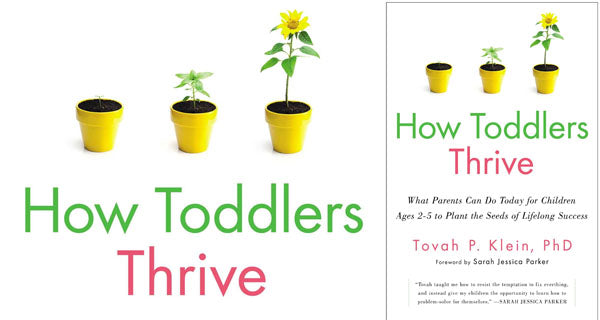
Last year we interviewed Dr. Tovah Klein, author of How Toddlers Thrive for a great podcast on the reasons why toddlers act as they do, and keys to help them thrive.
Dr. Klein is director of the Barnard College Center for Toddler Development, Professor of Psychology, and a consultant to Sesame Street. We talked about whether toddlers can share, why they throw tantrums, what to do about sibling conflicts, and how to set limits while maintaining a “hands-off” parenting approach.
Now we’re very happy to be able to share an excerpt from How Toddlers Thrive, recently out in paperback. We hope you'll enjoy this peek at a wonderful resource for parents of toddlers!
Setting Up Toddlers to Thrive*
Self-Regulation and the Key to True Success
Why do toddlers drive parents crazy?
Maya, having just turned three, reported to her mom that she was a big girl now. She was fully toilet trained and recently moved out of the crib into her “big girl bed.” The Monday after her birthday party, Maya woke up with exuberance and announced, “I can get dressed all by myself!” Unlike past mornings when she battled to get dressed or simply to pick out clothes, today she was ready to be on her own. “Go away, mommy, and I’ll surprise you.” Maya picked out her full outfit and got dressed—shirt, pants, socks, and even hair clips. She proudly announced this success to her family and sat down to eat breakfast, without the usual morning battle.
Her mother was thrilled and sure they had gotten past the worst of her toddler behavior. Maya chatted away, and then put some toys in her backpack, ready to head off to her toddler preschool. But it wasn’t time to leave yet. Her mother suggested they read a book. Maya happily picked out a book and plopped down on her mom’s lap to read. It was a calm and affectionate moment. While reading the book, they turned the page to a drawing of the book character eating pink ice cream. The mother read the words to accompany it.
As happy as ever, Maya jumped up. “I want ice cream, too!” she announced and marched toward the kitchen. Her mother kindly explained that they didn’t eat ice cream in the morning, and besides, they did not have any. In mere seconds, Maya crumpled to the floor, insistent on the ice cream, now screaming and yelling, devastated that there was no pink ice cream for her.
Her mother again explained that they did not have it, but she would buy chocolate ice cream (Maya’s favorite) at the store while Maya was in school.
“Nooooooo!” screamed Maya. “I need pink ice cream. Pink ice cream now!” Her mother felt helpless and frustrated as she struggled to get Maya, still flailing on the floor, in her coat and out the door for school.
What just happened? her mother wondered. Just five minutes before we were in this lovely moment, she had dressed herself, and now she is back to that irrational, demanding baby again.
The Toddler Paradox: What’s Going on Inside
Toddlers: They love us, they hate us.
They seem carefree and secure one minute, playing with confidence, and afraid of their own shadows the next, fiercely clinging to our leg.
They act and speak rationally one moment and irrationally the next, screaming because we cut their bread the “wrong way.”
They want to stay glued to our sides, seemingly helpless and completely dependent one day, and then push us away in fierce independence the next, yelling, “I can do it myself!”
They act like big kids one moment, feeding and dressing themselves, being polite—and then are helpless babies the next, unable to do anything for themselves.
They are laughing and full of joy one moment, and whining and in a full meltdown the next because of a simple “No.”
You get the picture. Toddler behavior is often paradoxical: they seem to swing between extremes for no apparent reason-or at least, this is the way it looks to us adults. The behavior of toddlers is often mystifying, confusing, and downright challenging. Why do their moods and their actions seem so erratic and hard to predict? How can we love them with all our hearts, but feel so powerless in the face of their crazy-making behavior? The answer to these questions is found when we peek inside their brains and understand what makes toddlers tick.
• • •
Tanya was a quiet and observant two-year-old. She took her time before deciding which activity to do each day at our center and avoided being near children who were playing in a physical manner. I worked with her parents to help her feel more comfortable with her physical abilities and not be so afraid of physical play. By the end of the year, she was becoming more comfortable.
Her parents returned to see me when she was three and a half. They were confused. They described Tanya as being “a kind and sweet little girl,” but now she was also “rude,” they said. They didn’t understand why. They reported that she had become more confident and outgoing at school and easily made friends. She tried more things on her own. She was less afraid of making mistakes. They were proud of these attributes. Then they described some recent incidents.
The mother explained, “When we get into the elevator at our apartment, Tanya is sometimes approached by a woman who asks her what her name is. Instead of answering, Tanya hides behind my leg and very loudly yells, ‘I don’t like you. Be quiet!’ Now if we get in the elevator and she sees this woman, she does not wait for her to say anything. She just screams at her, ‘I don’t like you!’ I am so embarrassed.”
Sound like a rude behavior? From an adult point of view it is, but Tanya does not mean to be rude. More than likely, Tanya behaved the way she did because she felt like a small person in a crowded elevator. Maybe she is frightened by the woman she hardly knows, or unsure of herself, or put on the spot. All could explain her desire to not interact and instead close down the situation.
• • •
What I’ve observed again and again in these paradoxes is that our children often trigger well-meaning parents to try to control or fix their kids’ “bad” behavior, without seeing the underlying need behind the behavior. I understand why this happens. A child’s actual need can be hard to decipher. Toddlers often do not communicate in straightforward ways.
What children are expressing through this chaotic, turbulent way of acting is actually fairly transparent: sometimes they feel in control of the big world they have just become a part of and are eager to explore and get to know, and sometimes they are completely overwhelmed by this same world, which can lead to feelings of anger, worry, fear, or a need for comfort. Sometimes they are able to brush their teeth and get into bed like mom or dad has requested; other times, this request to leave their toys or the family room where mom and dad have just been sitting around the television feels like being excommunicated from the family. Go to bed and be left all alone in that dark, scary bedroom without you? Are you kidding me?
Children are not mini adults. They don’t think like we do. They don’t see the world like we see it. Toddlers are not thinking ahead of themselves. They cannot. They are beings tied amazingly to the present tense, thinking only about themselves and wanting to feel safe, loved, taken care of, and yet independent all at once.
And this is true even when toddlers seem to be acting in ways that feel adult-like: When they talk back rudely. When they walk away callously or suddenly have very specific opinions about food they will eat or clothes they will wear. Again, this behavior may confuse parents. They try to meet the child’s “expressed” need or demand, but what is expressed may not really be what the child needs deeper down. And that’s what we are going to do: learn to decipher toddler behavior so that you can help your child learn to manage the world on his or her own—and not through controlling their behavior but by guiding them.
Many parents who come to see me start the conversation with some variation of this question: “What happened to my darling little baby?”
So what is going on during the transition from being a baby to being a toddler?
As children transition from infancy to toddlerhood, they are now moving around on their own, they are talking and talking back, they suddenly have opinions, and they can refuse food, naps, and baths. They have their own desires, and when they want something, they want it now! Our wonderful, lovely, dependent babies vanish overnight and in their place are sometimes whiny, demanding, still-adorable imposters. Who are these little rascals who are still so cute and yet so monstrous? Who need us but don’t want us? Who seem driven not by distraction but by an unstoppable inner desire to explore the world and all that is around them with their eyes, feet, hands, noses, ears, and yes, even their tongues?
When they don’t behave, or they act out, or they seem to ignore our directions, we resort to certain tactics: We want them to follow our rules, be good, and behave. We cajole, beg, and bribe them with rewards. We pray and hope that by example they will model themselves after us and our good behavior. Sometimes we resort to threatening them. Or yelling at them. If we’re lucky, when our toddler is really working our last nerve we can pass a child off to a babysitter or to a teacher or to a spouse and just walk away. Then, of course, our willful, strong-natured toddlers who just a minute ago didn’t seem to care for us at all are suddenly blue in the face with anger and frustration. They want us! They need us! Come baaaack!
These scenarios probably seem familiar. Parenting a toddler sometimes feels like a battle that can’t be won. Most of us have felt totally helpless in the face of our toddler at one time or another. Or maybe even many times. But it doesn’t have to be like this. It may be hard to believe, but life with our toddlers can actually be calm, fun, and enjoyable. The problem is that helping our children become happy and well-adjusted in their lives does not happen because we wish it so. Nor does it happen if we try to mold them or force them into being that person we desire them to be. There is no magic trick to force kids into becoming happy, successful adults. But when we learn to accept the good and bad of what our kids express—and start to understand why the furious development, emerging sense of self, and growth in their brains are actually what’s driving these dramatic swings in behavior—it all starts to make a lot more sense. You’ll be able to move away from immediate judgments of the actual behavior, and instead finally be able to understand what your child is really trying to tell you. And when you know what they are communicating, the response becomes much more clear.
Copyright © 2015 by Tovah P. Klein, PhD. From the book HOW TODDLERS THRIVE by Tovah P. Klein, PhD, published by Touchstone, a Division of Simon & Schuster, Inc. Printed by permission.



